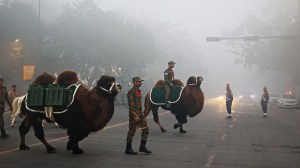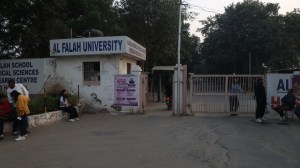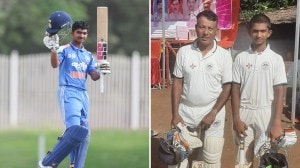Party,Interrupted
Goas image as a tourist paradise may have taken a beating after a series of crimes against foreigners but the sand and sun still lure visitors. However,that could change if the bad news continues. The Sunday Express travels to Goa to find a state in introspection....
Google Goa and the all-knowing search engine will throw up images of pristine beaches and Portuguese colonial buildings,along with links to hotels,resorts and tourism agencies that promise nothing but a good time. Suffix travel advisory or news and the results are anything but pleasant. More often than not,the headlines seem to scream rape,murder,drug overdose,terror threats,even a stray bomb blast,and the apparent inability of local authorities to deal with these. The spate of bad news seems unrelenting for Goa and the image of a tourist haven known for its sea,sand,sun and fun is taking a beating like never before in the three decades since it began to make it to the top of the worlds beach destinations.
The peak of the 2009/10 Christmas-New Year holiday season has been particularly cruel. First,a Russian tourist alleged that an acquaintance,a local politician,spiked her drink at a bar and then raped her in his vehicle after promising to drop her home past midnight. The reported police response and the delay in nabbing the man worsened the horror. Later in the month,two Russian women alleged that the driver of their taxi tried to rape them while they were returning from a Christmas party. Days later,a 23-year-old Delhi girl working in Bangalore died in a local hospital where she was brought after a suspected drug overdose at a popular music festival. And last week,a nine-year-old Russian girl was allegedly raped on a beach in daylight by an Indian man while his friend diverted the attention of the girls mother. It caused the Russian Embassy in Delhi to tick Goa off in some of the harshest diplomatic language used for an Indian state in recent times.
In fact,2009 has been Goas annus horribilis for the series of high-profile crimes that hogged the headlines,and the terror scares from foreign governments that raised questions about safety and security in arguably one of Indias most laidback states. Which is perhaps why Goas main tourism association is not exactly jumping with joy over the surge in foreign visitors to the state in 2009 which touched an estimated 5 lakh,a record high,despite the effects of the global economic slowdown not completely receding. The entire travel trade is very upset with these most hideous types of crimes, says Ralph de Souza,President of Travel amp; Tourism Association of Goa,a leading industry organisation. The image of the state has taken a beating because of three or four incidents and we are more worried about that than the impact on our businesses. It has totally eclipsed the fact that half-a-million foreign tourists have gone back happy from Goa.
He and his colleagues are not worried about the impact of this image on their industry,at least not yet,since little has changed on the ground. Hotels across the state are reporting good occupancy levels,the beaches are teeming with people,liquor shops are doing good business,the late-night beach parties continue mostly unhindered,and more evidently,foreign tourists can be seen roaming freely in various kinds of dress and undress. The fear psychosis is apparently more on TV news bulletins than on Goas beaches. But the travel industry fears their business would certainly be hurt if the trend of terrible negative publicity continues. Groups of young foreign tourists would especially be deterred from visiting Goa,de Souza says,as they appear to be the common targets of crime. We should not go by numbers of crimes. One high-profile crime is enough to damage us and that is of concern to us, he says.
There is little disagreement in Goa that there is crime in the state and that foreign tourists are targets as much as their Indian counterparts or locals. But there is no unanimity on whether there is an unusual rise in the rate of crime here or how the state compares to the rest of the country,with a battered Goa Police reluctant to share statistics. Stories,real and apocryphal,about a thriving narcotics and flesh trade,drug,gambling and mining mafias,organised crime syndicates and political and official collusion,also abound. So also theories about how Indias smallest state by area,which became free from colonial rule 14 years after the rest of the country,ended up where it is today.
FROM being a sleepy union territory which attracted hippies who smoked up and sunbathed in the buff,Goa became a serious international tourist destination in the early 1980s,drawing visitors particularly from across Europe. Today,tourism is Goas primary industry and has largely contributed to the state becoming one of Indias richest,with a high growth rate,per capita income and quality of life. The mining boom of the 1990s,followed by the real estate explosion in the last decade made Goa the envy of much of the rest of the country. But these expansions also sparked social and systemic problems in a state that was not too well prepared to deal with the surge in external influences.
Goa is fast-developing and modernising at an unparalleled rate. So along with the white sheep a lot of black sheep,both Indians and foreigners,are also entering the state, says Dr Bramhanand G S Cuncoliencar,head of the state governments Institute of Psychiatry and Human Behaviour in Bambolim. For many tourists,Goa has become a place for all that is illegitimate. All you need to do to find drugs is ask a taxi driver. And the government is in denial. It says Goa is not a destination for drugs but a victim of drugs. I think that is just a play of words.
Long-time residents of the state such as Cuncoliencar and de Souza also point at a little-known fact: Goas economic boom has become a magnet for migration with people from as far as Uttar Pradesh,Bihar,Jharkhand,Orissa,West Bengal and even Nepal coming here in search of a livelihood and easily finding one. de Souza claims that migrants,including those from the neighbouring states of Karnataka and Maharashtra,account for more than half the states population of about 15 lakh. Most of these migrant workers are single men. They dont have proper accommodation. Alcohol is the easiest and cheapest entertainment in Goa and is available almost everywhere. So it isnt such a surprise that some can get intoxicated and get into trouble, says Cuncoliencar.
But he does not absolve the local population either. There is a general increase in criminality among Goans like in any major Indian city and they are known to be well involved in the drug trade and gambling. Goa is thought to be free and open and foreign tourists dont feel insecure here. So local criminals probably feel they are easy prey and that they can get away by targeting foreigners as they are only passing through our country, says Cuncoliencar. When I was a medical student in the late 1970s,it was difficult for the medical college here to get dead bodies for anatomy studies. Today,mortuaries are generally full and sometimes struggle to get rid of unidentified bodies,people who have died of unnatural causes or victims of crime.
A large portion of the blame for Goas ills is laid on the states lack of a strong political authority,which in turn created a weak bureaucratic system unable to deal with the challenges of growth. Notorious as Indias Little Italy,Goa saw 14 chief ministers in the 15 years between 1990 and 2005 and three spells of Presidents Rule too,making the state synonymous with political instability. We are now settling down to two chief ministers per term, said Ashwin Tombat,Editor of the leading local English daily Herald. But he does not sound too optimistic about more change. Nothing will change unless a new,strong regional political force,a viable alternative that is different,emerges, he says. Today the local Congress and the BJP all appear the same. People are happily leaving or joining each others parties. There are no ideological moorings and even public expectation levels have become minimal.
The weakness in the system has led to a lack of accountability in many areas and some of that is visible in the state police,says Vikram Varma,a Supreme Court lawyer who moved to Goa in 2005 and is now the official counsel for Russians here. For instance,he says,there have been 50-odd crimes against foreigners in the last two years or so,seven or eight of them homicides and 22-23 of them involving Russians. While all the homicides are still under investigation and no chargesheets have been filed,there have been zero convictions in crimes involving Russians,he says. The politicians are busy keeping their basic ship floating so they are unable to address other issues, says Varma,referring to the insecurity of Goas unstable governments. Crime should not be interpolated to the growth in tourism. There are boundaries for everything and when something crosses that boundary,the state government should be perturbed about it and fix it.
Goa Police chief B S Bassi,as expected,is not willing to take all the criticism lying down. Although he says that policing the state,where tourists are spread all over unlike other major centres such as Delhi or Agra or Jaipur,is a unique challenge,he adds that his force takes all crime seriously and has a remarkable conviction rate of over 85 per cent for heinous crimes such as murders and rapes last year. While no state can be totally free of crime,Goa definitely is a safe place and there is no reason to believe crime is increasing alarmingly, said Bassi. You will find people here moving around freely,even in desolate places at night without any fear. Many of the high-profile crimes were committed by people who were known to the victims and betrayed their trust. But our job is not to preach or put fetters on people who come to holiday because they should not be bound by normal constraints when they holiday. Our job is to ensure their safety and we continue to work with that motive.
de Souza feels there is a hint of change already,possibly due to all the negative publicity and media attention,and the state police seems to be more responsive in the latest case of the Russian girls alleged rape. Tourism can be clean and also thrive without drugs or crime and all it needs is political will to act justly and quickly and better policing,he adds. Lawyer Varma does not venture as far as agreeing that change is visible,but he too is optimistic. I wouldnt say that Goa is in turmoil but there certainly needs to be more order. It is behind the rest of the country and is still maturing, he says. When a state is maturing,it goes through these evolutionary processes. But I feel change will come as it is inevitable.
- 01
- 02
- 03
- 04
- 05































